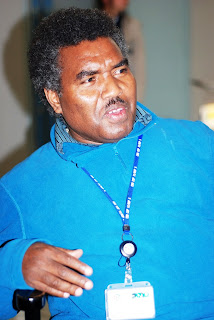The Pacific Voyage Media Team 29 October 2010 -
Joe Horoku, Solomon Islands
The Solomon Islands wants its forest and plants covered by protection under the Access and Benefit Sharing (ABS) framework at the Conference of Parties to the United Nations Convention of Biodiversity here in Nagoya, Japan.
The 10th Conference of Parties (COP) will be concluding its negotiations, as representatives of 193 countries are expected to forge a new global agreement on ABS for the use of biological or genetic resources.
Joe Horokou of the Solomon Islands Ministry of Environment, Conservation and Meteorology says his country is hopeful that under the ABS, bio-resources obtained by developed countries will share the benefits with local people.
Horokou cites that in the Solomon Islands, pharmaceutical companies are coming to the country and conducting research on medicinal plants that are found in their forest.
“Solomon Islands have potential for resources,” Horokou says.
The ABS framework is expected to benefit those communities from whom the pathogens or disease-causing organisms are sourced by pharmaceutical companies to develop drugs.
One company, he notes is doing research on a tree in Solomon Islands that may contain a cure for AIDS.
On the domestic front, Solomon Islands have already existing agreements that cover certain areas at present under the framework for access and benefit sharing.
The mechanism now exists for development of appropriate legislation on ABS.
Existing agreements cover some research work on agriculture and forestry. Some proposed agreements are being examined for other researchers but still the lack of relevant expertise is a constraint. Most efforts in this field are being assisted through programmes of the Secretariat of the Pacific Regional Environmental Programme (SPREP) and other international government organizations and non-governmental organizations.
He also says that Solomon Islands is interested in biofuel which could improve biodiversity.

No comments:
Post a Comment